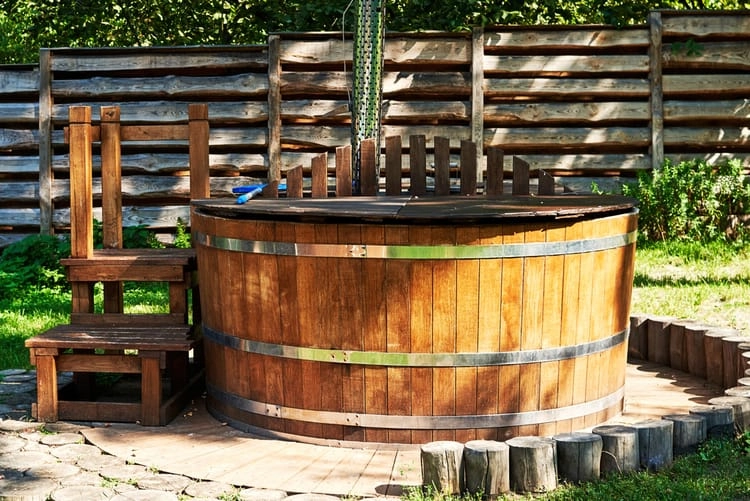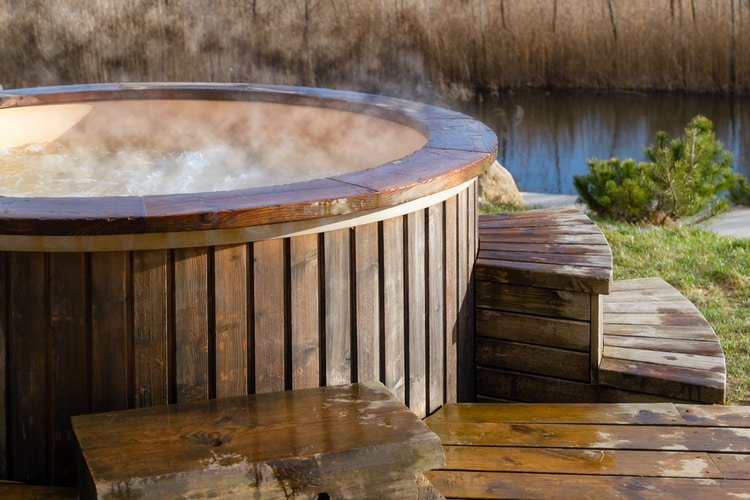Perhaps you’ve already decided on installing a hot tub at your home. Before you buy, you’ll want to weigh the pros and cons of saltwater vs chlorine for your hot tub. Saltwater and chlorine hot tubs are the same in terms of the way they are made but differ in how to keep them clean.
Saltwater hot tubs have a salt cell chlorinator that functions in producing chlorine naturally through an electrolysis process. Therefore you do not need to add chemical chlorine directly into the hot tub to keep it clean and hygienic.
Chlorine hot tubs require chemicals in concentrated amounts that you add to water and monitor the levels of chlorine.
However, there are pros and cons of installing both types of hot tubs, and this guide highlights the key factors to help you determine the best option for you.

Saltwater hot tub – Pros
Most people are searching for healthier alternatives to chemical solutions. The current saltwater hot tubs provide healing and soothing features without having the potential impact of chlorine. Below are some of the benefits of using a saltwater hot tub.
Increased water buoyancy and softness
The moderate amount of chlorine content produced by a saltwater system can keep the water quality soft for an extended period before refilling and draining your hot tub. The steady flow of natural salt minimizes the risk of having a cracked and dry skin.
The salt also increases water buoyancy to offer a more soothing experience as you soak in it. That is why most people with swelling and joint pains decide to install saltwater hot tubs. In particular, saltwater can draw moisture from the body and help reduce the chances of having conditions such as edema. Since saltwater is gentler on your skin, it can enhance circulation in the body.
Gentle on sensitive skin and eyes
If you have sensitive skin and eyes, you can expose them to irritation when your soak yourself in chlorinated water. In saltwater hot tubs, chlorine is naturally generated, which means chloramines aren’t likely to build up. That means your eyes skin and eyes will not be irritated which helps you stay in the hot tub longer and makes it more pleasurable.
No unpleasant odor
Chlorine solutions produce an unpleasant smell that can stick onto your hair and skin after soaking in chlorinated water. Fortunately, salt systems prevent chlorine from mutating into chloramines which produce a foul smell. That is because when you use natural chlorine molecules, they easily convert back into odorless salt or sodium chloride.
The increased buffering capacity of water
When you add an appropriate amount of salt into your hot tub water, you become more resistant to water chemistry changes. The mineral in saltwater assists in withstanding fluctuations in calcium hardness, pH, and alkalinity.
Cheaper to maintain
After you have installed your saltwater hot tub, the salt system will begin to sanitize water continuously. If you have an advanced saltwater hot tub, it can automatically adjust the salt content with heavier use.
Maintenance is easy – you will only have to test the water every week.
Salt Water Hot Tubs – Cons
Although saltwater hot tubs can be a great alternative to traditional hot tubs, they have their flaws. Here are some of the drawbacks of using a saltwater hot tub.
Corrosion causes added maintenance
Saltwater tends to corrode metals and excessive salt levels can damage underwater lighting, liners, and heaters. So although it can be cheaper to own a saltwater hot tub, with time you might end up spending more money to repair the metal fixtures corroded by salt.
For instance, a salt cell normally lasts between two to five years, depending on the frequency of use, quality of the cell, and how you care for it. Also, salt cells comprise parallel titanium plates that might chip off because of inadequate maintenance wear and tear and low salt levels.
Strict water temperature guidelines
With a chlorinated hot tub, rules on the temperature are limited. In most cases, the chlorine will pump through regardless of the temperature level.
However, when the water temperature falls below 60℉, the saltwater hot tub system will not efficiently produce adequate salts even if its salt cells are running. That is because a saltwater system will automatically shut down when it senses low water temperature, thereby minimizing the required salt level and establishing a favorable breeding environment for bacteria.
More maintenance time
With a salt water system, you will have to take your time to inspect cells to determine if their integrity is maintained to function effectively. So, you might need to remove the cell from its casing so that you can soak it in a solution of white vinegar for approximately 8 hours. During that period, you will not use your hot tub.
Harmful to plants and soil
Saltwater might damage the nearby plants and critical soil nutrients. Because of that, some states and Canada have banned the installation of saltwater hot tubs.

Chlorine Hot Tub – Pros
Does not damage your fixtures
Unlike a saltwater hot tub, your chlorinated hot tub will not damage the components of your hot tub. If you want to ensure that all accessories in or around your hot tub are safe, then chlorinated water is the best option for you.
Easy to maintain
A chlorine hot tub does not have complicated equipment like a saltwater hot tub. Saltwater hot tubs have complicated saltwater generator equipment that is used for the electrolysis process while a chlorine hot tub does not. That means you will not need to hire an expert to help you fix an issue that will arise. All you have to do is to check the chlorine content levels. Since you can easily maintain the hot tub, you will have more time to focus on enjoying your tub.
Minimized bacteria
Chlorine has high toxicity which can effectively kill disease-causing germs and bacteria in water. Therefore, if you want to have an ideal sanitizer in your hot tub you should go for the one that uses chlorine. That will also mean you will have a limited likelihood of being affected by germs when you bathe.
Chlorine Hot Tubs – Cons
Strong smell
Chlorine produces a strong, pungent smell which can be a turnoff. In reality, the smell is not caused by chlorine but is due to other chemicals that build up with time.
Irritations
While you take a bath, your cosmetic products, saliva, and sweat can mix with chlorine in the hot tub leading to the production of chloramines that can irritate your eyes and skin. Repeated exposure to significant amounts of chlorine can make you develop a skin rash. And the chemical can make your skin dry out and contribute to several unwanted irritations. Therefore, you should consider that before you invest in a chlorine hot tub, especially if you have sensitive skin.
More maintenance
You will need to regularly add chlorine and monitor the chlorine levels in your hot tub to ensure using it safely.
Chlorine chemicals can also be dangerous to pets and children if you do not store them properly.
No matter which hot tub you decide to install, you are your family are sure to enjoy many hours soaking and relaxing in it.

